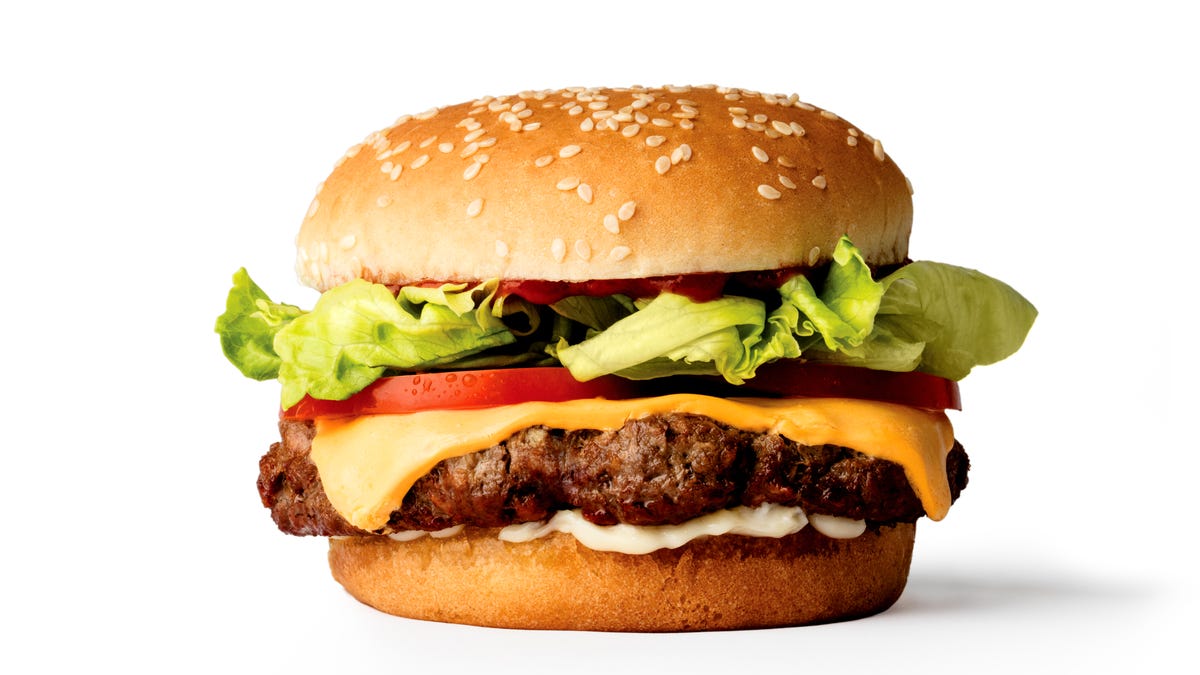Impossible Foods to supersize production of lab-grown burger
The maker of meatless patties opens a large-scale production facility and plans to pump out 1 million pounds of faux meat every month.

This hamburger is made entirely from plant proteins, but it looks, tastes and smells a lot like beef.
It's not easy to sink your teeth into one of Impossible Foods' lab-grown meatless hamburgers. After all, you can only get them at eight US restaurants.
On Wednesday, though, the company said it will bring its Impossible Burger to 1,000 eateries by year's end. To make that happen, the firm is opening a factory the size of a city block. The goal is to make at least 1 million pounds of faux burger meat every month.
"You can think of this as the birthplace of a whole new industry that's going to transform the food system," said Pat Brown, the former Stanford biochemistry professor who founded Impossible Foods in 2011 and serves as CEO. Brown spoke during a press event at the new facility, which is located in an industrial neighborhood of Oakland, California, and should hit peak production before 2018.
Impossible Foods is one of several tech startups hoping to convince people to eat meat and dairy substitutes. While Impossible is focused on burgers, rival Beyond Meat sells everything from plant protein "beef crumbles" to chicken strips. Another competitor, Ripple Foods, sells plant-based milk. Another, Hampton Creek, offers vegan mayonnaise called Just Mayo.
Rather than marketing to vegans and vegetarians, Impossible Foods and its cohorts are trying to tempt foodies and meat eaters. The idea is that not only can these faux meat products be healthier, with less antibiotics and hormones, but that they're also less resource intensive and more environmentally friendly. For example, Impossible Foods says producing one of its burgers requires only a quarter of the water and 5 percent of the land that making a conventional burger calls for, and that the process emits only 13 percent of the greenhouse gases.
"The way that we're producing meat now is incredibly destructive," Brown said. "Our whole mission is to reduce the environmental impact of the food system."
Impossible Burgers are made from a handful of ingredients, including wheat protein, potato protein and coconut oil. Many of these products have been used in veggie burgers before, so the Impossible Burger's real secret sauce is a natural substance called leghemoglobin, or "heme" for short.
Impossible Foods is the first food company to add heme to its vegan products in an effort to replicate the taste, color and aroma of animal meat. Heme is what makes animal blood red, and it's found in all living things, including plants. When Impossible Burgers cook in a pan, they secrete a pinkish juice that resembles blood, and they also give off the smell of charred meat.
To the undiscerning taste bud, it's this heme that makes it difficult to differentiate between the faux meat and what comes from cows.
Until now, the Impossible Burger was sold at only eight upscale restaurants, including Momofuku Nishi in New York City, Jardiniere in San Francisco and Crossroads Kitchen in Los Angeles. Impossible Foods said Wednesday that it's adding three new Bay Area restaurants to its roster: Kronnerburger, Public House and Vina Enoteca. Prices vary at these restaurants from $12 to $19 for a burger with sides.
But this is just the beginning for Impossible Foods. Once the company gets its new factory running at full capacity, it expects to eventually make Impossible Burgers available in grocery stores and international markets. Impossible Foods is also developing more plant-based meat and dairy products, like poultry, fish and steak, Brown said.
"You don't need animals to make uncompromisingly delicious meat," he said.
Batteries Not Included: The CNET team reminds us why tech is cool.
CNET Magazine: Check out a sample of the stories in CNET's newsstand edition.

